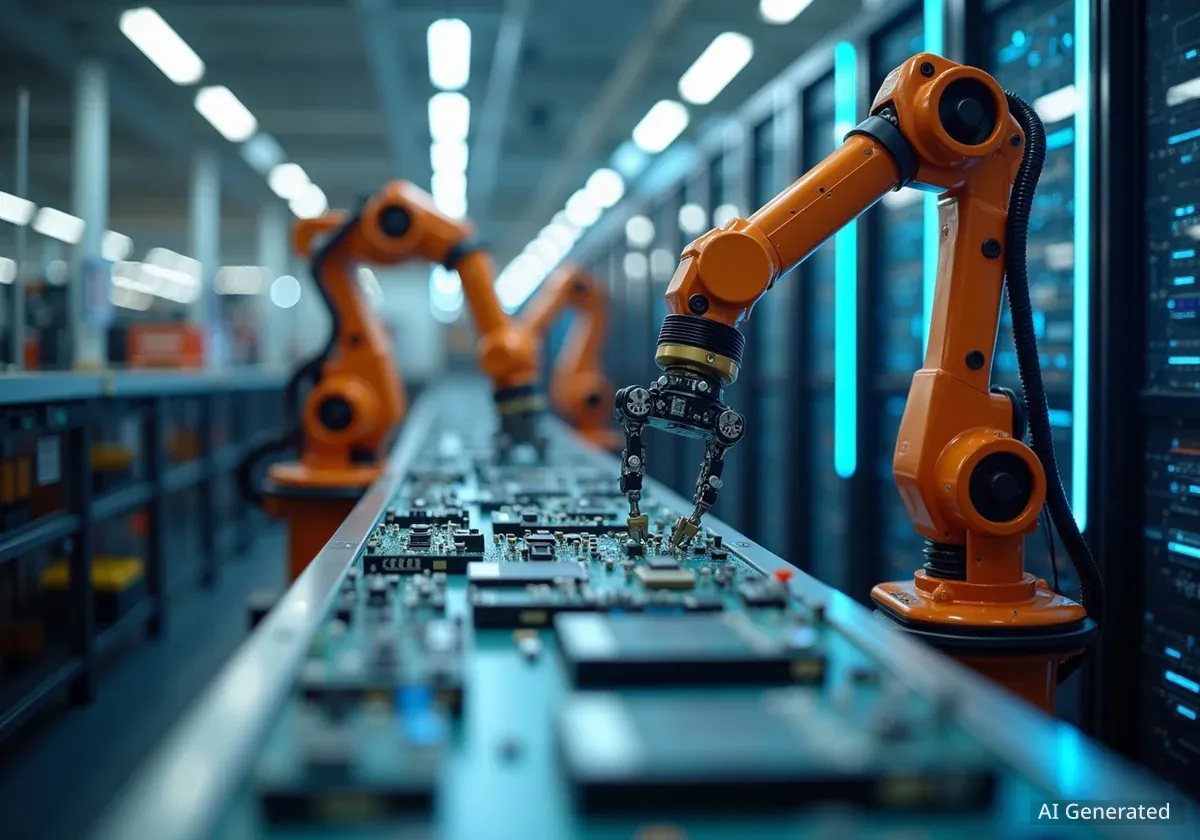Nvidia and Alibaba have announced a significant partnership that will integrate Nvidia's advanced artificial intelligence development tools into the Alibaba Cloud Platform. This collaboration aims to accelerate the development of AI for robotics, autonomous vehicles, and connected industrial spaces by leveraging Nvidia's simulation and synthetic data generation technologies.
Key Takeaways
- Alibaba is integrating Nvidia’s Physical AI software stack into its cloud services.
- The partnership focuses on training AI models for robotics, self-driving cars, and smart factories.
- Alibaba announced increased AI spending and a global expansion of its data centers.
- The company also unveiled its new large language model, Qwen 3-Max, trained on 1 trillion parameters.
Alibaba Integrates Nvidia's Physical AI Software
Alibaba confirmed on Wednesday that it will incorporate Nvidia’s Physical AI software stack into its Cloud Platform for AI. This move provides Alibaba's cloud customers with access to sophisticated tools for creating and training advanced artificial intelligence models.
The core of the integration is Nvidia’s software, which specializes in constructing detailed 3D digital replicas of real-world environments. These digital twins are instrumental for generating high-quality synthetic data, a crucial component for training AI systems without relying solely on real-world information.
This technology is particularly valuable for applications where real-world data collection is difficult, expensive, or unsafe. For example, AI models for self-driving cars can be trained on millions of simulated driving scenarios, covering a wide range of weather conditions and rare traffic events.
What is Synthetic Data?
Synthetic data is artificially generated information that mimics real-world data. In AI development, it is used to train machine learning models, especially when real data is scarce, sensitive, or biased. By using digital simulations, developers can create vast, diverse datasets to improve the accuracy and reliability of AI systems for tasks like object recognition in autonomous vehicles or navigation for warehouse robots.
Strategic Focus on Robotics and Smart Spaces
The collaboration between the two technology giants is set to impact several key industries. The primary applications for the integrated software include robotics, autonomous vehicles, and the development of smart spaces such as automated factories and warehouses.
By using Nvidia's tools on Alibaba's cloud, developers can simulate complex physical interactions and train robots to perform intricate tasks in a virtual environment before they are deployed in the real world. This process significantly reduces development time and costs while improving the safety and efficiency of the resulting AI models.
While the financial details of the agreement were not made public, the partnership represents a strategic alignment between the world's leading AI chip designer and a dominant force in cloud computing and e-commerce.
The collaboration brings together Nvidia, the foremost developer of chips optimized for training AI models, with Alibaba, a major cloud services and AI model developer, marking a significant step in the global AI landscape.
Alibaba's Expanded Commitment to AI
This partnership is part of a broader strategic push by Alibaba to strengthen its position in the artificial intelligence sector. The company announced its intention to increase its investment in AI technology, moving beyond its previously stated budget of $50 billion.
This increased spending supports a major expansion of its global infrastructure. Alibaba outlined plans to launch its first data centers in Brazil, France, and the Netherlands. This expansion will bring its total data center footprint to 91 locations across 29 regions worldwide, enhancing its capacity to deliver AI and cloud services globally.
Global Data Center Expansion
Alibaba's data center network is growing rapidly. The addition of facilities in Brazil, France, and the Netherlands extends its reach into key international markets, supporting the high computational demands of modern AI workloads for a wider customer base.
Introduction of Qwen 3-Max Language Model
Alongside the Nvidia partnership, Alibaba also unveiled the latest version of its proprietary large language model (LLM), named Qwen 3-Max. The company described it as its most powerful and capable model to date.
Key details of the new model include:
- It was trained on an immense dataset with 1 trillion parameters, placing it among the largest models in the industry.
- It is specifically optimized for complex tasks such as coding and agentic AI, where the model can perform multi-step actions autonomously.
According to Alibaba, Qwen 3-Max represents a significant advancement in its in-house AI development efforts. The introduction of this model, combined with the Nvidia partnership and infrastructure investment, underscores Alibaba's comprehensive strategy to compete at the highest level of the global AI industry, positioning its cloud platform as a central hub for AI innovation.





